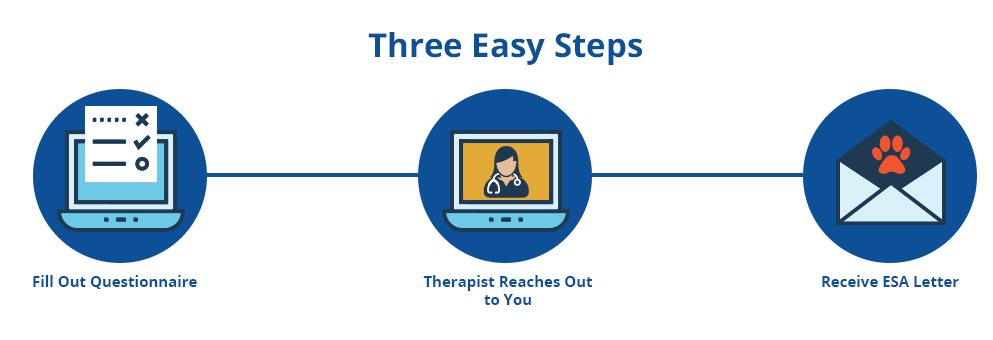HUD Housing Rules for Emotional Support Animals

Emotional support animals (ESAs) are protected under the federal Fair Housing Act (FHA). The FHA, however, doesn’t contain any specific information on how tenants and landlords are supposed to handle ESA requests. That’s where the U.S. Department of Housing and Urban Development (HUD) comes in.
HUD publishes guidelines that address how ESAs are to be handled by housing providers under the FHA. The most recent guidelines were released in 2020, which updated rules from 2013.
HUD makes these rules so that both ESA owners and landlords have clarity on what they need to do if a tenant needs an emotional support animal. By following these rules, ESA owners can understand the steps they need to take, and landlords can avoid violating the Fair Housing Act. In this guide we’ll explain 10 important things to know about HUD’s latest housing rules for ESAs.
10 Key Points to Know About HUD’s ESA Housing Rules
1. ESAs are not considered pets
Landlords cannot treat your ESA like a regular pet. This means no breed or weight restrictions apply. If your apartment policy or lease has a no-pet policy or bans large dogs, your ESA is still allowed as long as it is well-behaved and doesn’t pose a safety risk.
2. There are no pet fees or deposits for ESAs
Landlords cannot charge extra rent, pet deposits, or other fees for your ESA. However, if your ESA damages property, landlords can deduct costs from your security deposit, as they would for any tenant.
3. You can request ESA accommodation at any time
You can request ESA accommodation anytime, before or after getting your ESA. It’s a good idea to document the request for future reference. No special legal language is needed, but clearly asking for “reasonable accommodation” while submitting your ESA letter helps avoid confusion. Generally, it’s a good idea to let your landlord know before moving in with your ESA to give them a chance to approve or deny.
4. Landlords should respond to ESA requests within 10 days
HUD specifies that landlords should respond to ESA requests within 10 days of receiving the documentation. This prevents landlords from delaying decisions indefinitely, which can harm tenants.
5. You will need an ESA letter
You need an ESA letter from a licensed healthcare professional (LHCP) to prove that you need an emotional support animal. The LHCP must be licensed for your state. A valid ESA letter should include the LHCP’s letterhead, contact information, and signature, confirming your need for an ESA.
6. You can get an ESA letter online
HUD allows ESA letters from healthcare professionals who provide services remotely. As long as the professional is licensed in your state and has evaluated you, telehealth ESA letters are valid.
7. No other forms are required
Landlords cannot demand you fill out their forms, provide your medical history, or notarize documents. They must accept your ESA letter if it meets the HUD standards.
8. ESAs are not limited to cats and dogs
Dogs and cats are the most common ESAs, but HUD’s guidelines allow for other animals, such as birds, rabbits, hamsters, fish, and turtles.
9. You are responsible for damages as an ESA owner
As an ESA owner, you must care for your animal and ensure it doesn’t cause harm or disturbance. If your ESA is aggressive or damages property, the landlord has the right to take action. For example, if your ESA scratches up the doors or disturbs neighbors with excessive barking, your landlord can ask you to manage the behavior or cover any repair costs.
10. Landlords must work with you
If your landlord has concerns about your ESA request, they must engage in a discussion (called an “interactive process”) with you. They should explain their concerns and work toward a solution before denying the request.
Are you in need of an ESA letter? Start your assessment online below.

About the Author: The writing team at Service Dog Certifications is made up of folks who really know their stuff when it comes to disability laws and assistance animals. Many of our writers and editors have service dogs themselves and share insights from their own experiences. All of us have a passion for disability rights and animals.
Related Articles

What Makes a Service Dog Legal?
According to the U.S. Department of Justice, the Service Animal is defined as a dog that is specifically trained to perform a task (or tasks) for an individual with a disability. With this definition in mind, a Service Dog is not an ordinary pet or even one that is being used for emotional support (ESA). […]

Read More

ADA Service Dog Laws
You have legal rights in every city and state if you’re a service dog owner, thanks to one important U.S. federal law: the Americans with Disabilities Act (ADA). This law is the reason why you can take your service dog to restaurants, stores, hospitals, and other public spaces where pets can’t go. Under the ADA, […]

Read More

Service Dog Rights
1. Service Dogs have special public access rights under federal law Service dog owners have special rights under both federal and state laws. The Americans with Disabilities Act, commonly known as the “ADA,” is the primary federal law protecting owners of service dogs in all 50 states. Under the ADA, service dog owners have the […]

Read More
Can Landlord say renters ESA dog is only allowed to be 20 pounds. And not larger then 20 pounds. ?
Under HUD guidelines, emotional support animals are exempt from weight and size limitations that might apply to normal pets.